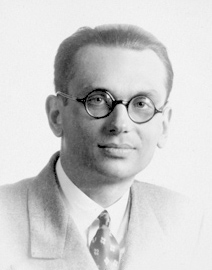 |
| Kurt Gödel |
Einstein defined the speed of light as the universal speed limit.
Supposedly nothing can travel faster than light...
But some things measured by physicists do.
For example, the information about "spin" with entangled photons. Here special pairs of photons are generated where within the pair the quantum spin of each is opposite. If there is no attempt to measure spin then the photons can be separated great distances and, when the spin is measured of one, the spin of the other is instantly known. Instantly meaning faster than light.
We do know that gravity affects light. During a solar eclipse certain stars which are "behind" the sun an appear because the light around the sun "bends". This was one of the first "proofs" of relativity using gravitational lensing done by Eddington in the early 1900's.
The question is was Einstein right?
I think the answer here lies outside of what we currently know.
All of our physicists today work inside of the "gravity well" generated by our sun, surrounding planets and star systems, and galaxy. That is, the same gravity lensing predicted by Einstein and measured by Eddington is universally present in our world and we cannot make a physical measurement without its presence.
I argue this is like always using a "bent ruler." What you build always works relative to other things built with the same bent ruler - but in absolute terms the measurements are not "right."
Quantum physics offers similar troubling concepts and, for one, it does not "explain gravity."
In fact, as far as I know, there is not direct evidence of how gravity works. Of course there are theories and measurements - but no basic understanding yet.
A physicist name "David Bohm" addressed some of this in his writings over the years.
Basically Bohm describes physics today as three blind men inspecting an elephant for the first time. Each experiencing at a different part. Subsequently the three attempt to reconcile what they experience. Can they do it? How would they perceive an elephant without prior knowledge?
He uses another analogy as well: cameras focused on a aquarium from different angles. Can you prove that the different views are of the same things?
Physics is defined by mathematics. Mathematics provides a system of rules for organizing evidence but does not guarantee that the there is any form of "completeness" to the evidence. We create mathematical formulas that describe accurately what we see - be we don't see everything. Just as Newton created Newtonian physics for perfect balls moving through perfect spaces, F = ma, and all of that.
His work did not take into consideration relativity and though his mathematical models worked they only addressed what he knew about when he constructed them.
The mistake science today always makes is that somehow it knows about everything when it makes declarations to the public.
But it doesn't and cannot ever.
Even mathematics is not powerful enough to be "complete" in and of itself and even though it is itself developed with sound logic and reason (see this on Kurt Gödel and his incompleteness theorems).
Humans always strive to see things as "complete."
Very few people like to have unfinished business "hanging over their heads." I think this tendency perverts science in the sense that no one wants to here that the billions of dollars spend, on for example, CERN, on produce more questions.
Similarly complex science always gets distilled down so "joe average" can understand it - after all his taxes are paying the bills and if "joe" doesn't understand something about what's going on then there will be no funding.
So we "simplify and dumb down" what's being studied and discovered so it makes "sense" to "joe." And in the process meaning is lost. Particularly the meaning of "we don't really know."
Einstein's (and Newton's) discoveries suffer from the same "processing" by news media and the educational system.
Einstein can only theorize about what is known at the time. Since he lived a century has passed. In that time we have gone from rural bumpkins on farms to highly educated city slickers with cellphones, cars, computers and all the rest. Our knowledge has advanced as well - quantum physics was developed since Einsteins discoveries - and have challenged some of his ideas (and him as well "God does not play dice").
I suspect that as more time goes by and more knowledge is collected the next Newton or Einstein will appear and make better theories and formulas to describe what's known in even better detail.
But that will not ensure that we know "it all."
And, after all, studying human consciousness was considered quackery until very recently.
Yet how can we understand the world around us if we do not understand the very essence of what we ourselves are.
Doesn't our own consciousness affect our understanding?
How can we understand without knowledge of what understanding is?
I predict that more physics will be discovered and developed to explain more of what is known.
But I doubt there will be an explanation of "everything" because, unless we make mathematics better, it cannot be used to support physics - it breaks down. And while we can beef it up with more axioms and rules Gödel proved that this merely creates a new and different set of unexplained elements.
Personally I think to key to all human knowledge lies in the meaning of Gödel's proof of incompleteness.
That key is realizing that his proof says we, our conscious selves, must exist outside of mathematics and physics - otherwise how could we "conceive" of proofs such as his about mathematics. Its says our conscious minds are more than mathematics can ever be - and more than science as well because science is based on mathematics.
No comments:
Post a Comment